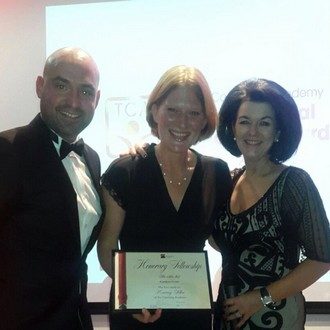I’m a big fan of an analogy – using a common situation or an identifiable scenario to draw parallels with our busy lives and illustrate the actions we can take to bring order and calm. I spend a significant proportion of my coaching sessions helping clients take back control of their time; sharing tips to help manage their schedules and prioritise where focus will bring real benefits. One of my favourite analogies to use here is filling a bowl with rocks, water and sand (or filling your life with all the various ‘stuff’ required to function).
Allow me to share it with you!
Imagine you have a bowl and you fill it to the top with rocks. Is it full?
But what if you add in some sand. Is it full yet?
Next add some water. Now is it full?
With the large rocks in the bowl it already seems full, but there is still room for the sand to run down into the gaps between the rocks. It is then possible to add yet more, even though the bowl looks full – adding water wets the sand and flows amongst the rocks to fill the spaces more effectively until finally the bowl is full.
Now consider that the bowl is your day, and the rocks, sand and water represent all the things that take up your time – the rocks are important things, the sand represents the urgent things and the water illustrates the routine things. Many of us spend the vast majority of our time doing urgent and routine things, the tasks that keep the hamster wheel turning and are easily spotted by others when they are not completed. Inevitably the important things are overlooked because there are always other demands on your limited time:
Important things
- Things you value
- Contribute directly to your purpose
- Don’t have a timeframe
- Examples might include exercise or taking a professional qualification
Urgent things
- Have a consequence if you don’t do them
- Have a timeframe
- These are often other people’s ‘urgent’ things: when a child cries, the cause is important to them but is it to you? Or a client’s issue – important to them, but do you really need to deal with the issue now?
Routine things
- Things we do every day, or on a regular basis
- Have a pattern
- Examples might include ordering stationery, cleaning, paying bills, doing the washing
If we fill our lives with the urgent and routine things (sand and water), we will always be busy – but where is our purpose? Without fulfilment we can become more like a robot than a sentient being. Adding the sand and water first leaves no room for the rocks – placing them in last simply means that the water and sand are displaced, creating a mess.
Which gives you one more thing to do!
I would say to all of you, think about what your ‘rocks’ are (they can relate both to your personal and professional lives) because the key to maintaining a sense of control and balance lies in always adding them in first!
Once your rocks are in, you can then control the amount of ‘urgent’ sand added to the bowl by assessing the tasks that will have the biggest impact and focusing on these first.
Consider the Pareto principle – originally postulated by an Italian economist who recognised that 80% of his country’s wealth belonged to 20% of the population. He, and others, then went on to test this principle across a wide range of common situations:
- 20% of your workforce produce 80% of your results
- 20% of clients create 80% of the sales
- 20% of pea pods contain 80% of the peas
- A role that you spend 80% of your time doing, gives you 20% of your fulfilment
By concentrating on the 20% in your daily life, you’ll feel more fulfilled, more in control and crucially you’ll achieve more tangible success. Ultimately, there are a fixed 24 hours available to us each day – when we talk about time management what we actually mean is self-management in the time available. So use those rocks, sand and water to manage yourself effectively and ensure that your bowl does not runneth over!
If you would like to take control of your life and career, my online personal development programme MyLifeStrategy can help you to overcome the personal and professional challenges you face on a daily basis and learn practical skills and techniques to make a real difference to you and your life.
I’ve developed the Time Management for the Time Poor module to help you to get the most out of your time. It will show you how to manage yourself and your behaviours, how to optimise your time, how to prioritise, delegate, stop procrastinating and put yourself back in control of your life and your time.













